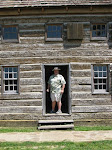To see a world in a grain of sand
And heaven in a wild flower
Hold infinity in the palm of your hand
And eternity in an hour
from Auguries of Innocence, William Blake, 1803
The English engraver, illustrator, and poet, William Blake, died a pauper on August 12, 1827. He was an English engraver and illustrator caught between the decline of the guilds and the rise of factory-based industry. It was a time when men saw the value of their labors swept away from the cottage and into the factory under the watchful eye of the manager. For workers, the loss of autonomy, the shift in control and production, and the helplessness in the face of change led to a revolt against the Age of Reason and a rage against technologies it spawned. To say that he was a radical would be an understatement. In fact his behavior as a nonconformist and mystic was so bizarre, and his interpretations of Christianity so original, that most of his contemporaries thought he was insane. Today, we have a more appreciative view of Blake as one whose vision, imagination and sensitivity were unmatched in the age of Romanticism, if not the western world.
 |
| William Blake Thomas Phillips, 1807 |
There is one certainty about Blake's writing and that is its complexity. He is by far one of the most interesting visionaries to come out of the West and its traditions. I hope you will take time to examine him and his extraordinary contributions to our experience. To explore his work appropriately is beyond the intent of this blog and capability of its author. For readers who want to learn more about Blake, to me there's no finer work available than Jacob Bronowski's A Man Without A Mask, published in 1944, and it's updated version, William Blake and the Age of Revolution, published in 1972.
 |
| Newton William Blake, 1795-1805 |
Blake was far from the only revolutionary artist to die in 1827. Ludwig van Beethoven passed away in March leaving behind this remarkable piece of music from the very edge of the Romantic movement. It could have been written yesterday but it is almost two centuries old and I believe is a perfect capture of Blake as he lived and of the message he left for all of us. In tribute:
He who binds himself to a joy
Doth the winged life destroy
But he who kisses the joy as it flies
Lives in Eternity's sunrise
Eternity, William Blake, 1803
Sources
Photos:
wikipedia.com
Blake portrait, National Portrait Gallery, Washington, D.C.
Newton, Tate Gallery, London, U.K.
Text:
wikipedia.com, Blake entry
poetry, blakearchive.org/Blake
Jacob Bronowski, A Man Without A Mask, Seeker and Warburg, London, 1944

No comments:
Post a Comment